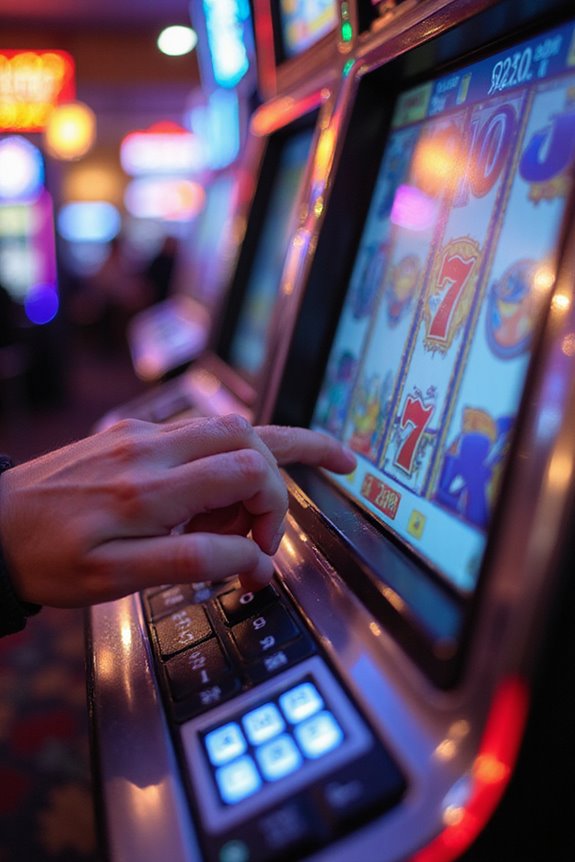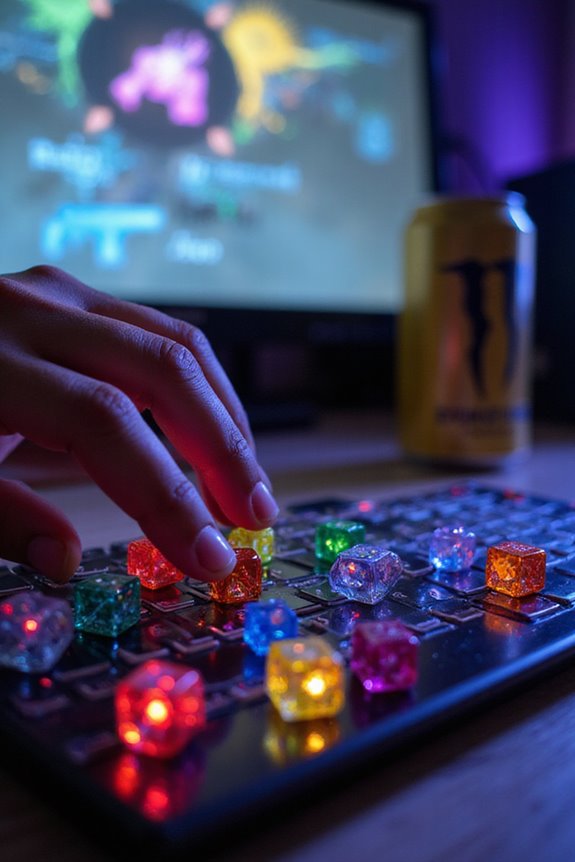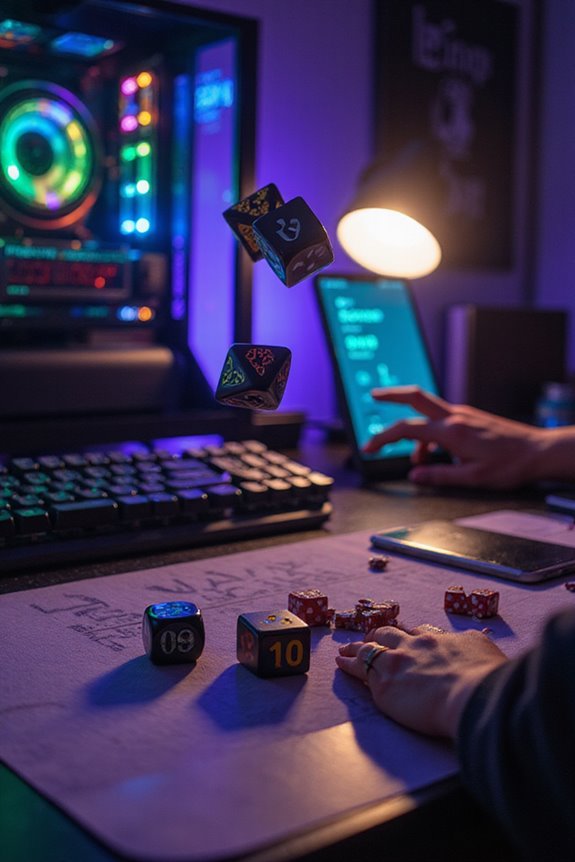RNG, or Random Number Generation, adds a thrilling unpredictability to gaming. Whether I’m spinning a slot machine or exploring a vast RPG, RNG keeps outcomes fresh and exciting. It creates unique experiences by randomizing elements like loot drops and character abilities. While PRNGs are fast but can be predictable if the seed is known, TRNGs offer true randomness at a slower pace. Curious about how this balances player engagement and design? There’s more to discover!
Key Takeaways
- RNG creates unpredictable outcomes in games, enhancing excitement and engagement for players through elements of chance and surprise.
- In slot games, RNG ensures each spin is fair and unbiased, building player trust and encouraging continued play.
- Randomized environments and character traits in games like Minecraft and RPGs promote strategic adaptation and unique gameplay experiences.
- Advances in RNG technology, including AI and blockchain, improve security and randomness, enhancing the overall gaming experience.
- Balancing unpredictability with fairness remains a challenge, influencing loot distribution and combat outcomes in game design.
Understanding RNG: The Basics of Randomness
When it comes to gaming, understanding Random Number Generation (RNG) is crucial, especially since it’s the backbone of countless mechanics we often take for granted. RNG comes in two flavors: Pseudo-Random Number Generators (PRNGs) and True Random Number Generators (TRNGs). PRNGs use algorithms that can produce sequences that seem random, but if you know the seed, you can predict them. On the other hand, TRNGs draw from unpredictable physical phenomena, like thermal noise, making them genuinely random. This unpredictability plays a significant role in loot distribution, combat outcomes, and even character progression. While RNG adds excitement, it can also introduce frustrations if outcomes feel unfair. Balancing unpredictability with fairness is the real challenge in game design, but it’s what keeps us coming back.
The Role of RNG in Slot Games

In the world of slot games, RNG plays a pivotal role, ensuring that every spin is as unpredictable as the last. These sophisticated algorithms work tirelessly, generating thousands of random numbers per second, even when no one’s playing. When I hit that spin button, the RNG determines the reel positions based on the latest number it produced, making each outcome independent and fair.
What I love is that this technology guarantees unbiased results, building trust as I play. Developers use RNG to craft exciting experiences, customizing payout ratios and hit frequencies. It adds complexity to the design while keeping me engaged. With continuous operation and regulatory oversight, I can enjoy the thrill of the game, knowing it’s all on the up and up.
Enhancing Gameplay With RNG in Video Games

Although RNG might seem like just a technical aspect of video games, it truly enhances gameplay in fascinating ways. Take randomized map layouts in games like Spelunky or Minecraft, for instance; each playthrough feels fresh and unpredictable. Character and item randomization injects variety into RPGs, encouraging players to adapt strategies.
RNG also shapes environmental factors, like changing weather, altering gameplay conditions. I love how it influences NPC behavior, making interactions feel more dynamic. Plus, it adds an edge to player decision-making with critical hits and tactical choices. The unpredictability keeps us engaged, fostering community as we share our unique experiences. Ultimately, RNG creates a rich tapestry of gameplay that keeps us coming back for more.
The Evolution of RNG Technology

RNG technology has come a long way since its inception, transforming how we experience games and ensuring fairness in outcomes. Initially, RNGs relied on basic seed numbers and simple algorithms for unpredictable results. Now, advanced algorithms continuously churn out random numbers, creating sequences without patterns, which is essential for fair gaming.
While hardware RNGs utilize physical phenomena, software RNGs depend on computational methods. Both need certification to guarantee integrity. The exciting part? We’re seeing new advancements like blockchain integration and AI optimization, enhancing security and player trust. Even with these innovations, there’s always room for improvement, as the quest for absolute randomness continues. It’s a journey, and I’m here for it, excited about where RNG technology is headed next.
The Impact of RNG on Player Engagement

When players plunge into a game, the thrill of unpredictability often keeps them on the edge of their seats. RNG systems introduce randomness, making each session unique, which is crucial for enhancing player engagement. I’ve noticed how this unpredictability creates an adrenaline rush, heightening anticipation and excitement. It also balances skill with luck, inviting more players to join in on the fun.
With pseudorandom number generators (PRNGs) powering these experiences, game developers can craft diverse scenarios that encourage replayability. Sure, RNG can be a double-edged sword—sometimes it frustrates—but the emotional investment it fosters can lead to memorable moments. Ultimately, RNG’s impact on player engagement is an enthralling dance of chance and skill that keeps us coming back for more.
Challenges and Limitations of RNG Systems
In the domain of gaming, understanding the challenges and limitations of RNG systems is essential for both developers and players. We often rely on Pseudo-Random Number Generators (PRNGs) for their efficiency, but they’re deterministic, meaning predictability can creep in if someone knows the seed value. True Random Number Generators (TRNGs) offer true randomness by harnessing physical processes, though they’re resource-intensive and slower to generate numbers. This trade-off between security and efficiency can be tricky. Additionally, centralization risks with PRNGs can lead to vulnerabilities, making them ripe for exploitation. It’s a balancing act, really—while we crave unpredictability, the underlying mechanics can sometimes limit that very thrill we seek in gaming experiences.
Ensuring Fairness and Trust in RNG Mechanics
Guaranteeing fairness and trust in RNG mechanics is essential for creating a positive gaming experience. I believe that transparent RNG operations are the backbone of fair play. Game operators need to disclose how RNGs function, and regular audits by independent labs help eliminate biases. When I see a certified seal, I feel more secure knowing the game meets industry standards.
It’s reassuring to know that these systems undergo rigorous testing to guarantee randomness. Players deserve access to audit results and clear game rules, which make everything more trustworthy. Plus, ongoing education about these practices helps demystify RNGs. Ultimately, when we can see that fairness is prioritized, it fosters a loyal, engaged player base, and that’s good for everyone involved!
Frequently Asked Questions
How Can I Tell if a Game Uses RNG?
You won’t believe how sneaky RNG can be! I’ve noticed inconsistent loot drops and unpredictable enemy spawns in games. If you see those surprises, it’s likely RNG at play, keeping my heart racing!
Are All RNG Systems the Same Across Games?
Not all RNG systems are the same across games. Each game’s design influences RNG type and implementation, meaning experiences can vary considerably. I find this diversity fascinating; it keeps every gaming session fresh and exciting!
Can RNG Be Influenced or Manipulated by Players?
They say “you can’t cheat fate.” I believe RNGs are designed to be fair and unbiased, so players can’t influence them. Trusting the random outcomes keeps the excitement alive in every game we play together.
What Happens if an RNG Fails During Gameplay?
If an RNG fails during gameplay, it can really ruin the experience. I’ve felt that frustration firsthand—outcomes feel unfair, trust erodes, and it disrupts the flow, making me question the game’s integrity.
Are There Regulations Governing RNG in Gaming?
Regulations regarding RNGs really reinforce reliability and responsibility in gaming. I’ve seen how independent bodies certify them, ensuring fairness and trust. It’s comforting knowing there’s a framework holding operators accountable for maintaining game integrity.


